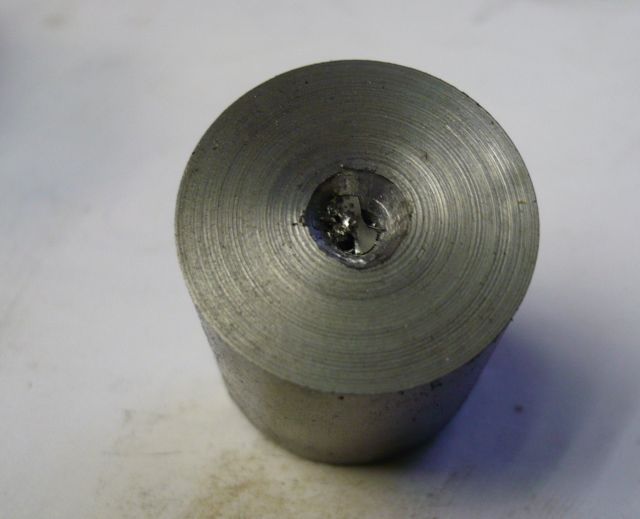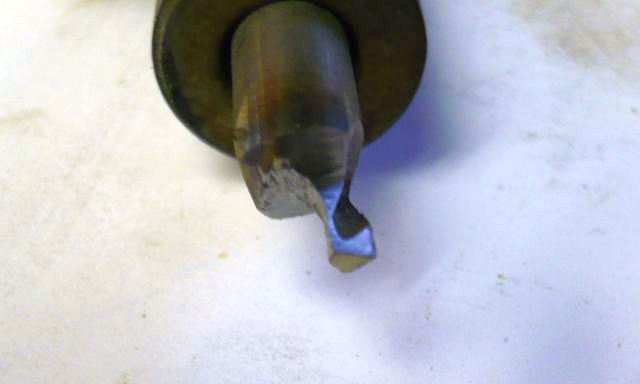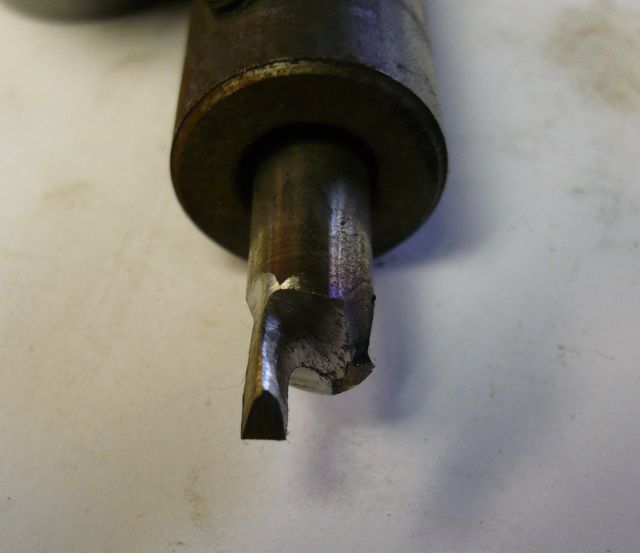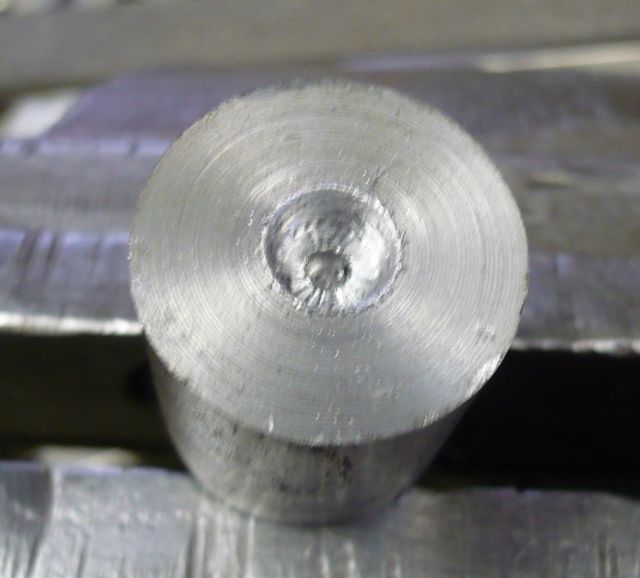I hate centre drills..............
| Andrew Johnston | 28/09/2013 20:03:48 |
7061 forum posts 719 photos | ...........discuss! I've just broken another one; that's the second one in as many weeks. Fortunately the broken bits came out easily. It was the last turning operation on my embryo hob for a worm wheel: I'd have been right put out if the part had been scrapped. If nothing else it's 30 quids worth of silver steel. The centre drills I've been using are a no-name set I bought many years ago, from an ME supplier, although I'm not sure which one. I've just put the whole lot in the bin; best place for them. I'll keep the nice wooden box they came in though. On Monday I'll order a new set from a reputable professional tool supplier. I never use centre drills for starting twist drills on anything other than the lathe. When drilling on the mill I either start straight with a four facet twist drill, or use a carbide spot drill. Did I say I hate centre drills? Regards, Andrew
|
| JasonB | 28/09/2013 20:35:36 |
25215 forum posts 3105 photos 1 articles | Dig them out the bin, they are easily reground to start a new life in a boring bar holder or as a one off form tool. I don't even use them for starting drills in the lathe now prefering a spot drill, only time they really come out is when I want a hole for a ctr or the cone on a steam fitting or if I need the long reach ones. Does anyone make long reach spotting drills?
J |
| Stub Mandrel | 28/09/2013 21:58:46 |
4318 forum posts 291 photos 1 articles | > Does anyone make long reach spotting drills? I made a simple 'long spotter' by turning a cone on the end of a silver steel rod, and grinding away half of it. Interesting point Gray. My keyless chuck is hard to tighten up securely, so I just keep a centre drill in it. I hope I haven't been sabotaging them all! Neil |
| John Stevenson | 29/09/2013 00:02:45 |
5068 forum posts 3 photos | Centre drills are a throw back to early lathe work. All the books like Chapman write about these as rote but seeing as there have been no new books written for centuries all the old rubbish gets regurgitated in any *new* books that come out
Easier to copy / paste than do home work.
The original use for a centre drill was two fold, firstly to put the cone shaped hole in to support a centre and secondly to act as a reservoir for white lead paste that was used as a lubricant for the dead centres of the day.
Now the first reason still applies but seeing as most people today use revolting centres the long pilot is no longer needed, in fact it's a disadvantage as if it breaks the whole tool is scrap and probably the work. A good dodge is to regrind new centres to about half the pilot length, enough to clear the tip of the centre plus a couple of regrinds.
THEN only use these for placing centre holes in work for use with lathe centres.
Anything else you use spotting drills, in industry today you virtually never see centre drills as spotting drills have taken over for one simple reason, they are better or industry wouldn't use them.
However if you do break a centre drill don't throw it away. Usually this is what you get.
Sooooooooooo.
Make the perpetrator do the repair.
Grind the old broken centre drill up as a trepanning tool as in the two pics below.
Top view.
Bottom view, not the clearances all ways round.
Then feed this in round the brokem tip until the broken bit stands proud, then a quick smack leaves it like this.
Which is now easier to reclaim now it's missing a hardened piece of tool steel |
| I.M. OUTAHERE | 29/09/2013 03:48:11 |
| 1468 forum posts 3 photos | Just out of curiosity have you checked to see that your tailstock is on centre ? Ian. |
| Thor 🇳🇴 | 29/09/2013 05:05:11 |
1766 forum posts 46 photos | John, that's a very nice way to get the tip of a broken centre drill out of the work. Thor |
| Boiler Bri | 29/09/2013 06:44:59 |
856 forum posts 212 photos | That's a good idea John. Looks like you have had a few broken ones to come up with that idea. I usually dig or shatter them out with sharp centre punch. |
| Jens Eirik Skogstad | 29/09/2013 06:47:15 |
400 forum posts 22 photos | Do undo broken centre drill: Keep centre drill sharp and use cutting fluid depending on which material you are using as a work piece. Take light cut under work. Be sure the tailstock is in center. |
| Stub Mandrel | 29/09/2013 09:16:16 |
4318 forum posts 291 photos 1 articles | Hi John, Your expertise in grinding that little tool suggests you don't follow your own advixce about not using centre drills Seriously though a good tip for the larger sizes, but it's usually BS0 I break I thought the point was that the centre drill also ensured the centre touches the cone and doesn't bottom if it has a sharp tip and the drill making the depression doesn't. Of course a two step spotting drill followed by a smal ordinary drill can avoid this, but it is two steps. There is a third way - I have an old-fashioned hardened 4-sided centre that can be used to true up an off-centre hole hole or sort out one that has gone 'nasty' - either might easily break another centre drill. Not used much, but has proved its worth. Neil |
| colin hawes | 29/09/2013 09:50:35 |
| 570 forum posts 18 photos | The pilot on a centre drill is there to giv clearance to the sharp point on a lathe centre. If there is no clearance you can't be sure that the job is running in the 60 degree angle. So far as I'm aware spot drills are nearer 90 degrees so also would be iffy as a centre drill. Colin |
| John Stevenson | 29/09/2013 10:06:49 |
5068 forum posts 3 photos | Neil, I originally posted this on another forum a while ago, in fact the pictures are dated January 09. I looked for one of these trepanning cutters and as usual because I wanted one, couldn't find on so I sorted out, found a centre drill that had seen better days from a tin of old HSS blanks. Then proceeded to break it on purpose just for the photo essay.
From what I can remember, because it was a pre-shortened one, which is what I do to all the centre drills, it took some breaking , just because I wanted it to break. |
| Ian S C | 29/09/2013 11:08:49 |
7468 forum posts 230 photos | The broken bits can be resharpened as little counter bore drills, and mini countersink drills. As well as tools for boring bars, they make quite good tooling for flycutters in the milling machine, I'v used one to make a gear cutter that worked OK for the job on hand. Ian S C |
| John Stevenson | 29/09/2013 11:18:57 |
5068 forum posts 3 photos | Posted by colin hawes on 29/09/2013 09:50:35:
The pilot on a centre drill is there to giv clearance to the sharp point on a lathe centre. If there is no clearance you can't be sure that the job is running in the 60 degree angle. So far as I'm aware spot drills are nearer 90 degrees so also would be iffy as a centre drill. Colin Colin, No one is saying use a spotting drill instaed of a centre drill for running a centre in, what we are saying is save the centre drills for the use they were intended and use spotting drills to start holes be it in the lather or mill. |
| SteveW | 29/09/2013 11:39:59 |
140 forum posts 11 photos | I don't own any spotting drills, but I'm thinking about it! Could you use a spotting drill to drill a final hole accurate enough to tap? I am thinking of 2.5mm about 10 deep. I know that's not really what they are for but it could save me a bit of time on a repetitive job SteveW |
| John Stevenson | 29/09/2013 11:48:28 |
5068 forum posts 3 photos | Yes, no problems. |
| JasonB | 29/09/2013 13:22:25 |
25215 forum posts 3105 photos 1 articles | The only problem with that is you will have to back the drill out more to clear the swarf as the flutes are very short. The other thing the 90deg spotting drills can be used for is to chamfer or even countersink the edge of a hole by drilling until the spot is larger than the intended hole. This saves having to go back after the hole is drilled and either Csk or deburr They also make handy engraving tools, I used an 1/8" spotting drill to do these grease cups this morning. Edited By JasonB on 29/09/2013 13:25:42 |
| NJH | 29/09/2013 15:03:32 |
2314 forum posts 139 photos | I always thought a major advantage of the centre drill is in its extra rigidity especially as a starter for small drills ( I' m thinking < 2mm particularly) I have a few which seem to work well for me but I also bought a couple of spotting drills which I agree work in the larger sizes? I guess, in the hobby arena where we have to pay for all our own tools, the temptation is to carry on using drills for too long whereas in a commercial situation they would be replaced. Andrew I do feel your pain though! Norman |
| Rik Shaw | 29/09/2013 18:03:27 |
1494 forum posts 403 photos | I had no idea centre drills were old fashioned. I have a box of 50-60 and use them all the time for starting drills and also for forming cones for my lathe centres to run in. I treat them gently and have not busted one for years - fingers crossed. Old fashioned they may be but then - so am I. Rik |
| Dougie Swan | 29/09/2013 19:49:47 |
| 269 forum posts 73 photos | Apologies for this if seems a daft question, but what is a spotting drill? Dougie |
| JasonB | 29/09/2013 19:53:27 |
25215 forum posts 3105 photos 1 articles | Short drill with either a 90 or 120deg angle and very little "flat spot" that you get where the two cutting edges meet which makes it start where you want it.
I see thay also do a 140deg point so your split point or 4 facet drill wont snatch as it starts and in answer to my own question yes you can get long ones eg 1/4"dia x 6" long
Edited By JasonB on 29/09/2013 19:59:27 |
Please login to post a reply.
Want the latest issue of Model Engineer or Model Engineers' Workshop? Use our magazine locator links to find your nearest stockist!
Sign up to our newsletter and get a free digital issue.
You can unsubscribe at anytime. View our privacy policy at www.mortons.co.uk/privacy
- *Oct 2023: FORUM MIGRATION TIMELINE*
05/10/2023 07:57:11 - Making ER11 collet chuck
05/10/2023 07:56:24 - What did you do today? 2023
05/10/2023 07:25:01 - Orrery
05/10/2023 06:00:41 - Wera hand-tools
05/10/2023 05:47:07 - New member
05/10/2023 04:40:11 - Problems with external pot on at1 vfd
05/10/2023 00:06:32 - Drain plug
04/10/2023 23:36:17 - digi phase converter for 10 machines.....
04/10/2023 23:13:48 - Winter Storage Of Locomotives
04/10/2023 21:02:11 - More Latest Posts...
- View All Topics
- Reeves** - Rebuilt Royal Scot by Martin Evans
by John Broughton
£300.00 - BRITANNIA 5" GAUGE James Perrier
by Jon Seabright 1
£2,500.00 - Drill Grinder - for restoration
by Nigel Graham 2
£0.00 - WARCO WM18 MILLING MACHINE
by Alex Chudley
£1,200.00 - MYFORD SUPER 7 LATHE
by Alex Chudley
£2,000.00 - More "For Sale" Ads...
- D1-3 backplate
by Michael Horley
Price Not Specified - fixed steady for a Colchester bantam mark1 800
by George Jervis
Price Not Specified - lbsc pansy
by JACK SIDEBOTHAM
Price Not Specified - Pratt Burnerd multifit chuck key.
by Tim Riome
Price Not Specified - BANDSAW BLADE WELDER
by HUGH
Price Not Specified - More "Wanted" Ads...
Do you want to contact the Model Engineer and Model Engineers' Workshop team?
You can contact us by phone, mail or email about the magazines including becoming a contributor, submitting reader's letters or making queries about articles. You can also get in touch about this website, advertising or other general issues.
Click THIS LINK for full contact details.
For subscription issues please see THIS LINK.
Model Engineer Magazine
- Percival Marshall
- M.E. History
- LittleLEC
- M.E. Clock
ME Workshop
- An Adcock
- & Shipley
- Horizontal
- Mill
Subscribe Now
- Great savings
- Delivered to your door
Pre-order your copy!
- Delivered to your doorstep!
- Free UK delivery!



















 Register
Register Log-in
Log-in


